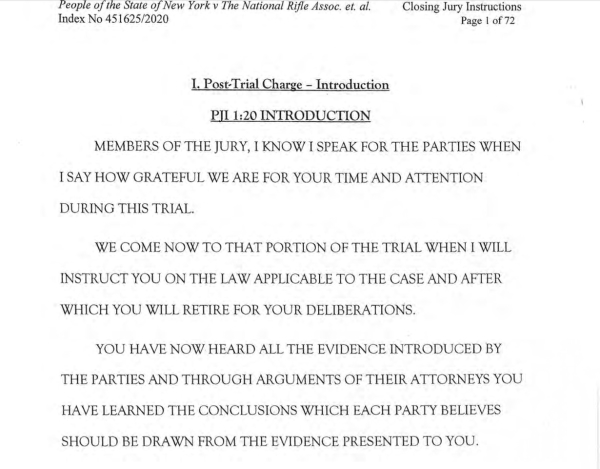With apologies to the reader last week who angrily asked “Why are you so consumed with the NRA” and threatened to unsubscribe if we persisted in writing about it; seems there’s no relief in sight-at least not for the immediate future.
The jury’s not returned a verdict in the New York trial, and the story still matters- greatly- to both sides of “the gun question.”
There’s a simple reason: the National Rifle Association represents the interests and desires of something between four and six million people. Those people represent a large cross-section of gun owners and Second Amendment supporters across the country.
Being members of an advocacy organization, they’re generally more motivated to fulfill their civic duties. In short, the NRA represents a lot of voters.
Votes, especially when measured in the millions matter. Scatter a few hundred thousand around in key “swing” states and watch how election results change.
It may irritate this reader, but millions of voters, no matter what their predispositions on virtually any topic matter.
But the New York trial isn’t really about the members; it’s about their leaders. The leadership and management of the NRA is charged with failing their duties of care for the organization, i.e., making certain the Association is run correctly and properly.
And it’s not a single incident, it’s a “pattern of abuse” the State of New York alleges were permitted from March 20, 2014 through May 2, 2022.
The NRA leadership - by way of their attorneys in the case- say the allegations were true- but the wrongdoing has been corrected, the abusers chastened, the funds restored and everything’s just fine in the organization, no further action needed.
New York officials disagree. That’s because their case isn’t based on NRA policies. As a New York chartered not-for-profit, the NRA and its leadership are required to follow New York statutory requirements- not NRA policies and procedures.
It is, in essence, four trials wrapped into one. Verdicts will directly impact the NRA and each of the three individuals. But it won’t necessarily impact each of them equally.
Now, it’s up to six average New York citizens to decide who’s version of things is most correct.
That’s why it matters.
Right now, the jurors are answering a specific set of questions. Here are the first two questions they’re being asked to answer:
Questions 3&4 repeat the questions for defendants Wilson “Woody” Phillips and John Frazier.
From there, the jurors are asked to decide whether LaPierre and Phillips benefitted from “related party transactions” (post-employment consulting deals), along with questions regarding similar “related party transactions” that included hair and makeup expenses for Susan Lapierre, personal appearances and shooting instructions from Dave Butz, speaking engagement payments to Sandra Froman, direct payments from both the NRA and NRA-ILA to Marion Hammer, payments to former NRA officer Josh Powell, Powell’s father’s photography business, and speaking engagements to David Keene.
It’s quite a laundry list of alleged offenses.
Unfortunately, it’s been hashed, re-hashed and argued in very public feuds between parts of the current NRA board, former board members and a third group of board members they claim were expunged by LaPierre for questioning his authority.
That alleged board expungement is another question the jurors are being asked to decide.
The State of New York alleges that the NRA failed to follow whistleblower procedures, allowing “intimidation, harassment, discrimination or other retaliation to discourage reporting of improper conduct” against former board members Lt. Col. Oliver North, Richard Childress, Esther Schneider, Timothy Knight, Sean Moloney, Rocky Marshall, Philip Journey and Craig Spray.
That question, along with the other violations of the duties of trust alleged by the New York Attorney General’s office, will determine what actions -if any- Judge Joel M. Cohen will authorize to correct the abuses and set the NRA’s proverbial house in order.
It’s important to note that in this trial the finding of the jury doesn’t have to be unanimous. Only five of six jurors must agree in order to answer ‘yes’ or ‘no’ to prove or disprove the AG’s case.

And how they should reach their verdict, however, isn’t a matter for speculation or consensus. Judge Cohen issued very detailed instructions to the jury designed to help them clarify their roles, reach their verdict, and be certain they used the facts of the matter to decide the case -or cases.
They’ll decide six key questions - all as defined under New York statues, not NRA policies:
1) Did the NRA (the organization) fail to properly administer the charitable assets of the organization>
2) Did LaPierre, Philips and Frazier breach their “duty of care and good faith”?
3) Were there wrongful party transactions by the NRA (organization), LaPierre and Philips?
4) Were there removals of officers for cause by LaPierre and Frazier?
5) Were there violations of whistleblower protections by the NRA (organization)?
6) Were there false filings under executive law by the NRA (organization) and Frazier?
Sometime- soon- the jury will announce their decisions. But the story’s far from over.
And, yes, as always, we’ll keep you posted.
—Jim Shepherd